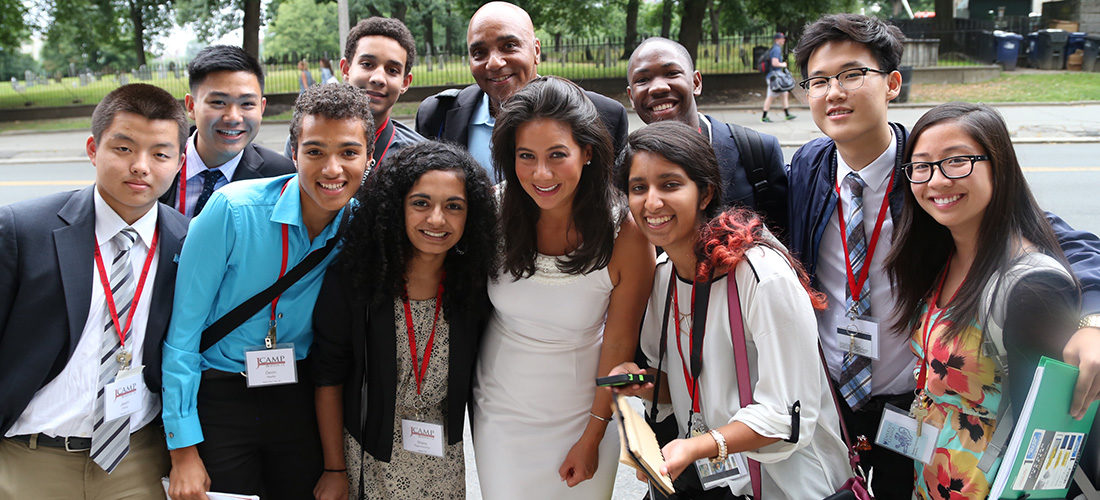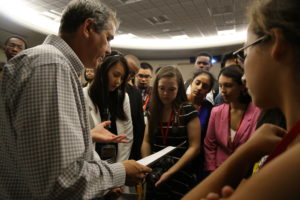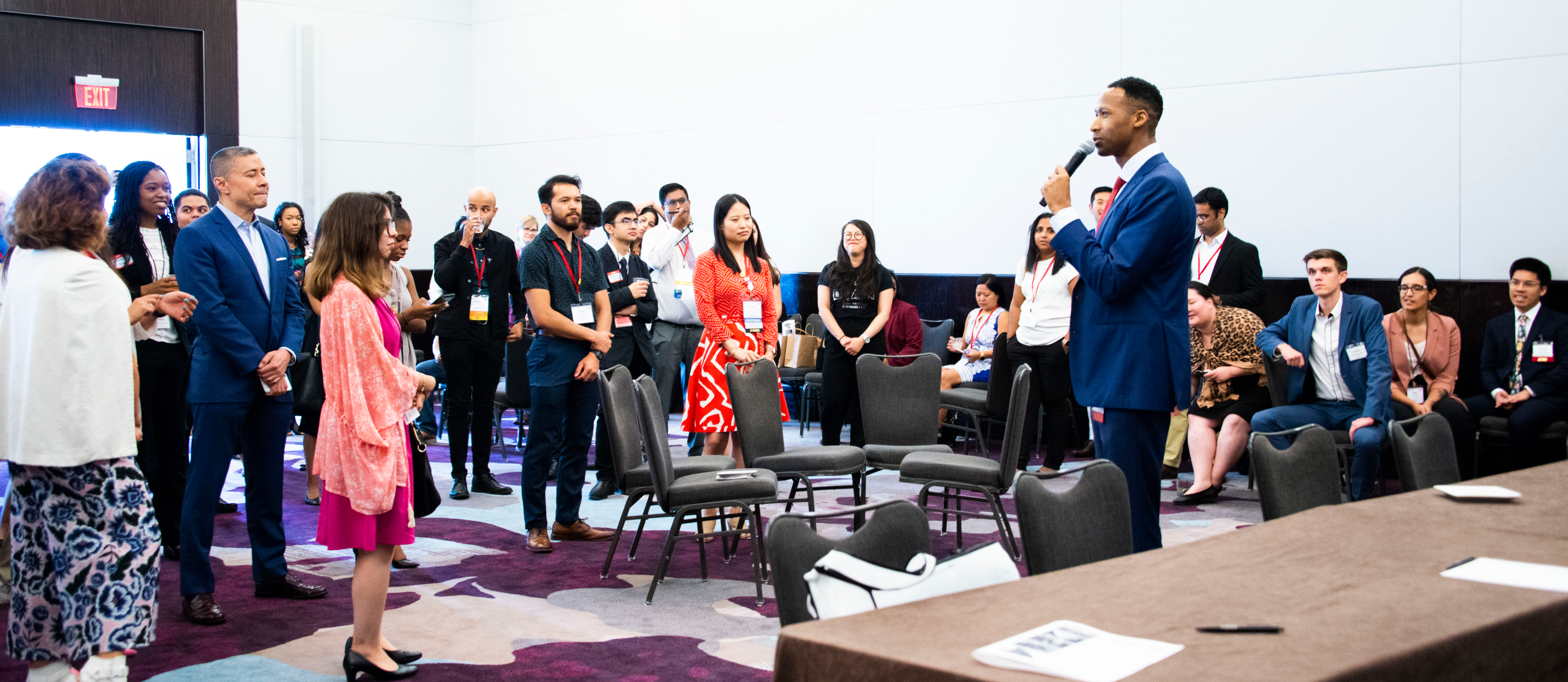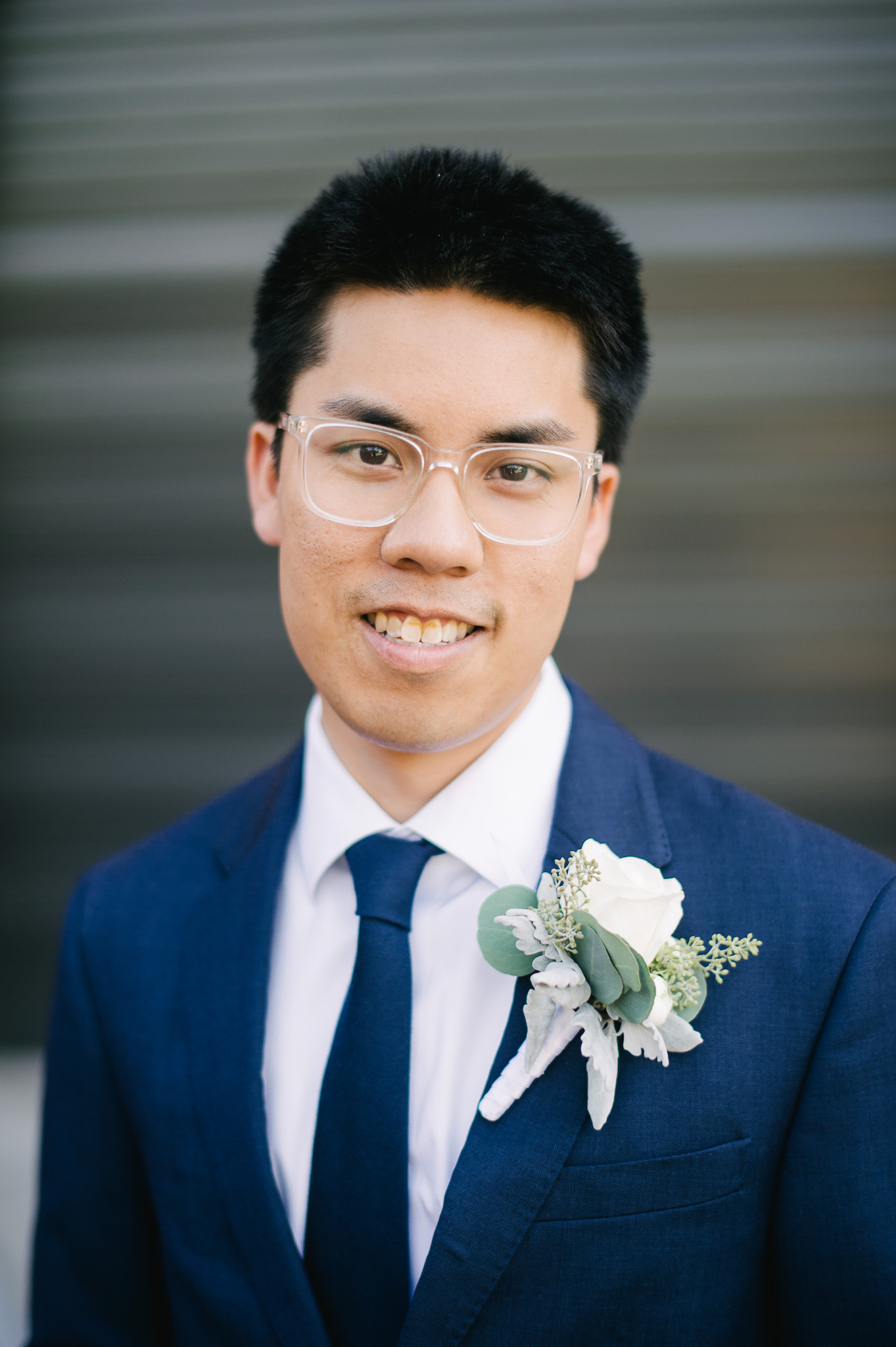
AAJA’s JCamp is a national multicultural journalism program for high school students.
The six-day training camp brings together culturally diverse students from across the nation to learn from veteran journalists and leading media executives. JCamp participants will receive hands-on training and produce multiplatform news packages for the program’s news site, JCamp Live. Since 2001, over 700 high school students have graduated from JCamp. Every year, AAJA receives hundreds of applications from all regions of the country.
JCamp was started in 2001 as a response to the industry’s diversity crisis. The program is designed to help assure excellence in the profession for decades to come and to confront the lack of diversity in journalism, not just in race, but also in matters of religious background, political background and other factors. Since the program began, hundreds of the nation’s most talented teenagers have graduated. Early surveys of JCamp students indicated that approximately 75% went on to pursue journalism in college. With a multicultural team, media get more accurate perspectives on stories of Latinos, African Americans, Asian American and Pacific Islanders and Middle Eastern Americans.
With a diverse team, readers and viewers get different views on city governments, local communities, business, entertainment and recreation, science and medicine and national and international issues.
 AAJA’s JCamp is a national multicultural journalism program for high school students. The six-day training camp brings together culturally diverse students from across the nation to learn from veteran journalists and leading media executives. JCamp participants will receive hands-on training and produce multiplatform news packages for the program’s news site, JCamp Live.
AAJA’s JCamp is a national multicultural journalism program for high school students. The six-day training camp brings together culturally diverse students from across the nation to learn from veteran journalists and leading media executives. JCamp participants will receive hands-on training and produce multiplatform news packages for the program’s news site, JCamp Live.
JCamp’s goal is to develop the next generation of journalists. This six-day training camp brings together a multicultural group of high school students from across the nation to sharpen their journalism skills and work together in a unique learning environment. The curriculum consists of interactive workshops, hands-on training and field trips.
Selected students demonstrate a keen interest in broadcasting, newspaper, magazine, photojournalism or online media. This program is not limited to Asian American students, but to all high school sophomores and juniors. There is no fee to apply and all costs are covered — including airfare, lodging and meals. Students stay in university housing during the camp week.
JCamp strives to confront the lack of diversity in journalism, in regards to race, socioeconomics, geography, religion, sexual orientation and identity. The camp strives to ensure excellence in the profession for decades to come. Through this culture of excellence and diversification, JCamp cultivates the voices and views of our future media leaders on government, human interest, entertainment, recreation, science, medicine and national and international news.
The curriculum focuses on teaching and ingraining the following core principles:
- Cross-cultural communication skills – Interactions with peers and mentors from completely different environments and backgrounds
- Fundamentals of leadership – Faculty work with students on persuasive communication skills, teamwork, professionalism, project management, self-advocacy, developing a personal identity and accountability
- Importance of diversity in newsrooms and in media coverage – JCamp fosters an appreciation and respect for diverse viewpoints and reporting in diverse communities
- Strong ethics in journalism practice – Students gain an understanding of the universal ethics of good journalism and upholding high standards
- Fostering connections – Students learn how to effectively network and cultivate contacts in an industry powered by interpersonal relationships
- Building self-confidence – Students encounter curated challenges designed to empower them and build their sense of self-worth and encourage personal growth.

Since the first JCamp in 2001, almost 900 of the nation’s brightest young people have graduated from JCamp. Some of the graduates of JCamp have gone on to become professional journalists. A few of these alumni include:
- Terrell Brown, JCamp 2002: After attending JCamp, Brown was awarded a full scholarship for broadcasting excellence by the National Press Club. In 2009, at age 22, Brown was named a CBS News correspondent — the youngest in that network’s history.
- Jessica Carballo, JCamp 2004: Carballo won the Sun-Sentinel Correspondent of the Year Award, the Sun-Sentinel scholarship upon high school graduation, and she was the Miami Herald Silver Knight Winner in Journalism. She worked as an ABC production intern at WPLG-TV in Miami and is a 2010 graduate of Yale University.
- Hailey Lee, JCamp 2009: Lee studied at Wellesley College and founded WCTV, the school’s satire news show. She interned at Crain’s Chicago Business before being hired permanently at CNBC. She is now an economics producer and has served as a board member for UNITY: Journalists for Diversity.
- Taylor Turner, JCamp 2010: Turner studied broadcast journalism and political communications at The University of Texas at Austin while also interning at ESPN and participating as a video journalist for The New York Times’ Student Journalism Institute in 2015. Turner worked as a production associate at ABC News before her current position as a video editor at The Washington Post.

Arelis R. Hernández is a Texas-based national correspondent for the Washington Post covering the US-Mexico border, immigration and other Lone Star stories. She has covered natural and human disasters, breaking news and politics both domestically and internationally for the Post since 2014. She previously covered crime for the Orlando Sentinel and graduated from the University of Maryland. She is also co-director of the Asian American Journalists Association’s high school journalism program and has volunteered since 2013.

Ben Bartenstein ('11) is a London-based correspondent for Bloomberg News. A native of rural Wisconsin, he's reported across five continents with assignments in the UAE, the US, Peru, Morocco and Spain. Bartenstein graduated with a degree in International Studies from Macalester College in St. Paul, Minnesota.

Timmy Huynh ('05) is an operations manager and photo editor at the Wall Street Journal. He earned a graduate degree from the Missouri School of Journalism and currently lives in New York City with his wife Paige.
Application Information
Applications for the 2025 JCamp cohort are open!
High school sophomores and juniors are encouraged to apply. Students selected for the program have all costs covered including airfare, campus housing and meals.
AAJA welcomes donations to its student and professional programs throughout the year. Your donation to the JCamp program will go a long way toward helping the students produce quality work and gain valuable newsroom experience!
From the JCamp archives
To see the 2021 JCamp cohort’s work, visit the 40th anniversary website.
Frequently Asked Questions About JCamp
ABOUT JCAMP
JCamp is an all-expenses-paid immersive summer journalism program for the most promising multicultural high school students from across the country. Held in a different city every year, the six-day program provides a rigorous, thoughtfully curated experience, offering hands-on reporting and production opportunities, access to state-of-the-art media and educational facilities and exposure to some of the industry’s leading professionals at top local, national and global news outlets.
JCamp was founded by journalists Neal Justin, Josh Freedom du Lac and Mark Angeles in 2001 to diversify the pipeline of talent entering journalism. Previous JCamp speakers include TODAY Show anchor Hoda Kotb, Pulitzer Prize winner Wesley Lowery, Los Angeles Times executive editor Kevin Merida, legendary music journalist Ben Fong-Torres, late night television host Jimmy Kimmel, President Joe Biden and the late PBS news anchor Gwen Ifill. There are approximately 900 members of the JCamp alumni community.
JCamp is focused on preparing students for the realities of the journalism business and empowering them with the knowledge to break into the profession. We teach a mix of hard and soft skills that are needed to succeed in journalism but not commonly taught in traditional classroom settings or expensive summer programs.
The curriculum focuses on teaching and ingraining the following core principles:
- Cross-cultural communication skills – Interactions with peers and mentors from completely different environments and backgrounds
- Fundamentals of leadership – Faculty work with students on persuasive communication skills, teamwork, professionalism, project management, self-advocacy, developing a personal identity and accountability
- Importance of diversity in newsrooms and in media coverage – JCamp fosters an appreciation and respect for diverse viewpoints and reporting in diverse communities
- Strong ethics in journalism practice – Students gain an understanding of the universal ethics of good journalism and upholding high standards
- Fostering connections – Students learn how to effectively network and cultivate contacts in an industry powered by interpersonal relationships
- Building self-confidence – Students encounter curated challenges designed to empower them and build their sense of self-worth and encourage personal growth.
There are many student summer journalism programs out there but no one else does what we do the way we do it with the people we have, making for a truly special, unparalleled opportunity.
Diversity and inclusion is in our program’s DNA, including race, ethnicity, household income, language, geography, gender identity, sexual orientation, citizenship and neurodiversity. We believe in connecting talent with opportunity regardless of ability to pay; some of our students have traveled the world while others get on a plane for the first time to come to camp. With such a talented and diverse cohort, students learn as much from each other as our instructors, building lifelong career contacts, allies and friendships.
What also sets JCamp apart is the people. Our all-alumni leadership team works at some of the top media outlets in the world — Bloomberg, CNN, Disney/ABC Television Group, The Washington Post and The Wall Street Journal. We’re personal testaments to the power of JCamp. We have been in these students’ shoes. We get it. JCamp has done so much for us and it’s why we’re passionate about paying it forward. As experienced working professionals, we’re on the frontlines of this ever-evolving industry, helping keep JCamp fresh, constantly up to date and at a uniquely competitive advantage.
Nothing. We do not charge any tuition or fees. Thanks to our generous sponsors, all domestic transportation, baggage fees, lodging and meals are covered. Students are still welcome to bring pocket money for things like souvenirs or snacks.
JCamp is a program of the Asian American Journalists Association (AAJA), which provides administrative and operational support to the program’s leadership team. JCamp’s executive officers are all volunteers, JCamp alumni and professional journalists.
ELIGIBILITY
Current high school sophomores and juniors are eligible to apply. We have found sophomores and especially juniors tend to be the most ready for the rigors of our program, which is why we no longer accept freshmen applications. Current seniors are not eligible because we want students to take what they learn at JCamp back to their high schools in the fall.
No, you do not have to be Asian to apply. We welcome high school sophomores and juniors of any background. Our leadership team is reflective of AAJA’s broad understanding of diversity.
No. Membership is not a prerequisite, although it is encouraged since AAJA offers many benefits for students at a discounted rate of $25. You do not have to be Asian to join AAJA.
International students may apply as long as you will physically be in the U.S. before and after camp since JCamp will not cover international travel. International applications must also be submitted entirely in English. Please note our program is focused on the journalism industry in the United States and not all teachings may apply in other parts of the world.
Yes, but you must physically be in the U.S. before and after camp since JCamp will not cover international travel.
APPLYING
The application is a mix of written essays, short answers and a short video that helps us get to know you beyond what’s on the page. Each application is read by multiple reviewers from the JCamp alumni and faculty community followed by multiple rounds of review. Applicants will be notified of a decision via email.
Yes. We understand not everyone has the opportunity to take journalism classes or participate in campus media. If you don’t have such options available, we want to see how you are taking initiative and which alternatives you are pursuing instead — perhaps independent study, freelancing, blogging, podcasting, social media content creation, filmmaking, writing op-eds, etc.
Applications open in early January and close in early March, although we strongly recommend not waiting until the last minute in the event of any technical or logistical problems. All application materials, including letters of recommendation, must be complete and submitted by the deadline.
We look for a combination of things. Among them:
- Authenticity – Be yourself, show us what makes you unique
- Curiosity – How you seek out knowledge, opportunities, experiences
- Demonstrated interest in journalism or relevant experience
- Leadership experience or community involvement
- Storytelling skills – How you tell your story, communication skills
Take applying seriously. Do your research on JCamp and what makes this program unlike any other. Read the application closely and follow the guidelines. Take advantage of the optional questions. Spend time crafting thoughtful, well-written, specific answers. Proofread and spell check. Attend the application Q&A Zoom session and come prepared with informed questions. Your video doesn’t have to be super polished, but show us who you are and what makes you unique. Just note as professional writers, we can tell who put a lot of time and care into their application and who filed at the last minute.
You should ask someone who is not only familiar with your current work, abilities and potential, but also someone who you can count on to write your letter in time. (Make sure you give them plenty of advance notice!) Teachers often write recommendations but we have seen letters from working journalists, managers at part-time jobs and other mentors.
No. Due to the volume of applications we receive, we are not able to accommodate individual updates after the deadline.
No. Using AI to assist with applications is not permitted at this time because reviewers want to learn about you in your own words and how you tell your own unique story.
No. Due to the volume of applications we receive, AAJA and JCamp leadership are unable to consult on individual applications. Please consider attending the Q&A Zoom held before the application deadline where you can ask general questions. Please monitor our social media accounts for announcements on the date, registration instructions, etc
ADMISSIONS
Class size can vary depending on the year. We will accept around 30 students.
Students will be notified of a decision either way by mid-April via email.
In the event a previously admitted student cannot attend JCamp, we will reach out to students on our waitlist. This may happen on short notice. Students on the waitlist are not guaranteed acceptance.
If you applied as a sophomore, yes, you can apply again. Juniors who are not accepted will not be eligible in the next application cycle for JCamp but we encourage you to check out AAJA’s other student programs, such as student awards, Mentor Match or Voices.
No. Admitted students must commit to JCamp for the entirety of the program schedule.
No. While we know students are eager to share their good news and meet each other, admitted students are NOT allowed to post about JCamp on social media – even anonymously – until AAJA has publicly announced the class list. (Admitted students will be notified when the embargo lifts, which will happen closer to the program start date.) Students found in violation of this policy may have their spot revoked and offered to another student on the waitlist.
Unfortunately, no. Due to the volume of applications we receive, we are unable to provide individual feedback.
PREPARING FOR CAMP
The dress code for professional programming is business casual. Students can wear casual clothing on arrival day and in the evenings after programming has concluded. Admitted students will receive a detailed dress guide and suggested packing list before camp.
It’s up to you, especially if you are particular about your pillow or linens. Our host facility, often a college dorm, usually provides these items but they may be thinner or lighter than what you are used to at home.
As an AAJA program, JCamp follows the AAJA convention Covid-19 policy.
Yes, we require a negative test within 48 hours of departure to be emailed to programs@aaja.org.
If you have one and want to bring it to take notes, write or edit, feel free to do so, but this is optional. We will also supply pens and notepads for note taking.
No, and this is intentional. Admitted students are not allowed to publicly share their acceptance — including on social media — because part of the magic of JCamp is meeting your classmates for the first time in person. Trust us — getting out of your comfort zone will boost your personal growth and help form bonds with each other quickly.
DURING CAMP
The schedule changes year to year but expect a mix of high-profile guest speakers, Q&As, interactive workshops, small group discussions, one-on-one feedback, hands-on reporting experiences, field trips and networking opportunities.
Yes. Admitted students provide this information in the formal acceptance form.
Hands-on activities include supervised multimedia reporting trips in the field, practice anchoring TV newscasts, and trying breaking news live shots. Check out past written reporting projects on the JCamp Medium blog.
During years the program coincides with the AAJA convention, we spend the final full day of JCamp at the convention site for our own programming. AAJA will register students for the convention free of charge for the JCamp networking reception held at the convention hotel. After camp concludes, students with parental permission may stay to attend the remainder of the convention (excluding the closing night gala, which is ticketed separately) but they will be responsible for themselves and their expenses, including lodging etc.
Usually yes, depending on the class size and dorm/host facility that year.
No. There is limited free time and admitted students must commit to JCamp for the entirety of the program schedule. You will need to make arrangements before or after camp to complete non-JCamp homework.
AFTER JCAMP
Most of our alumni go on to study journalism in college and/or get involved with campus media. Many of our alumni are working at top local, national and international news outlets such as The New York Times, CNN, NBC News, The Texas Tribune, local TV news affiliates, Politico and nonprofit journalism organizations as reporters, producers, anchors, editors, correspondents and executives. While many alumni have pursued careers in communications, film and the arts, marketing, politics, tech and business, they report the storytelling skills they learned at JCamp have served them well in their careers.
Yes, JCamp is just the beginning of AAJA’s pipeline of student programs. Check out the student awards categories, Mentor Match and Voices for college students.
Yes, students may join AAJA at a discounted rate of $25. You do not have to be Asian to join AAJA.
FOR PARENTS & GUARDIANS
We’ll send more details to admitted students closer to camp but JCamp volunteers wearing JCamp shirts will meet students at baggage claim.
Adult chaperones will be present at all common areas on and off campus.
No. JCamp is an educational program, not a vacation. We adhere to a packed schedule with limited free time. Any free time is designed to spend with the JCamp community to foster interpersonal relationships and develop cross-cultural communication skills. We will ask students to sign forms agreeing to focus exclusively on JCamp and not be distracted with schoolwork or any other program during the week of the program.
AAJA requires JCamp faculty to undergo annual background checks. Depending on the program host site, access may be restricted to our buildings or entire campus. Students are under adult supervision at all times outside of their dorm rooms and restrooms. The AAJA convention hotel also has professional security.
Yes, JCamp leadership will hold a pre-camp Q&A on Zoom for admitted students and parents to ask questions closer to camp. Details will be sent via email.
No, please do NOT check in your student as an unaccompanied minor. It’s unnecessary – students eligible for our program are beyond the intended age range for most major airlines – and it’s not feasible for our small team. Unaccompanied minor situations present difficult logistical hurdles and take away valuable limited resources.
SUPPORTING JCAMP

Applications for JCamp 2025 are now open
Apply for AAJA’s AAJA’s national high school summer training program by January 31, 2025 Applications for JCamp 2025 are now open! This year’s program will

AAJA Announces JCamp 2024 Cohort
The Asian American Journalists Association (AAJA) is excited to announce its 2024 JCamp cohort. JCamp 2024 is taking place from Aug. 3-9 in Austin, Texas.

Applications for JCamp 2024 are now open
Apply for AAJA’s AAJA’s national high school summer training program by March 1, 2024 Applications for JCamp 2024 are now open! This year’s program will
